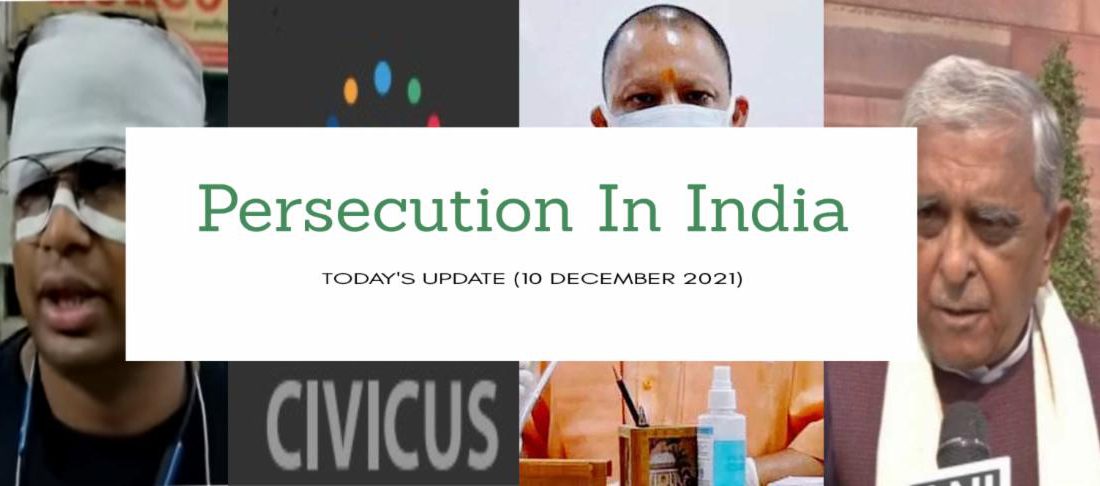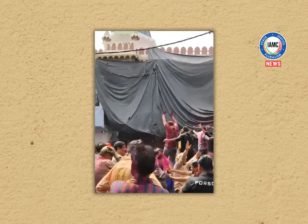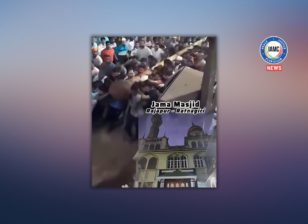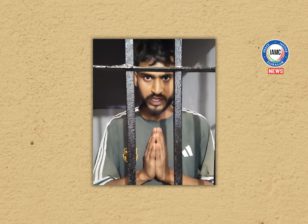City Officials Paint Mosque In Hindu Color Of Saffron Without Permission Of Muslim Community
The state of Uttar Pradesh has the highest number of human rights violations in India, according to the latest report of the National Human Rights Commission (NHRC), an autonomous federal body.
This is the third year in a row that the state has topped the list, with 24,242 reported violations between January and October 2021. The state accounts for a staggering 40% of all documented human rights violations in India.
This is hardly a surprise given that Uttar Pradesh is controlled by the Bharatiya Janata Party (BJP), the party of Prime Minister Narendra Modi, which is not only directly complicit but an active organizer of violence against and persecution of social and religious minorities, human rights defenders, journalists, lawyers and political opponents.
The nearly-five-year-old BJP-ruled Uttar Pradesh government of Chief Minister Adityanath has provided total impunity to Hindu extremists to carry out mass violence and campaigns of intimidation against Muslims and Christians. Adityanath is one of India’s most openly anti-Muslim and anti-Christian public leaders.
In the past month alone, he has called for the destruction of a 17th-century mosque, referred to Muslims as “terrorists,” and praised his party for shifting state funds away from minority communities’ needs and funneling them towards Hindu pilgrimages.
With this rhetoric coming from the top of the political ladder, Uttar Pradesh has become increasingly dangerous for religious minorities. In June of 2020, more than 200 Muslim residents of a UP village were forced to leave their their homes because of intimidation by state police officials.
Hindu extremists engaging in “cow vigilantism” regularly attacked Muslims for being in possession of beef, beating and sometimes murdering them. Muslims have also been detained or assaulted under supposition of “Love Jihad,” a conspiracy theory concocted by Hindu extremists that claims Muslim men have an agenda to seduce and marry Hindu women.
Christians have also been under attack. According to a fact-finding report, 66 cases of anti-Christian attacks occurred in Uttar Pradesh this year, out of 305 anti-Christian incidents nationwide. This makes Uttar Pradesh the most dangerous state in India for Christians.
BJP Member of Parliament Seeks Repeal Of Law Protecting Places Of Worship To Convert Historic Mosques Into Temples
A member of Indian Parliament from the BJP has demanded that the Places of Worship Act, which protects religious structures from being forcibly converted into other types of spaces, be repealed.
“The meaning of this law is that it basically legitimizes forcible occupation of places of worship… by foreign invaders…This discriminates against Hindus, Budhhists, Jains and Sikhs. I request that it be repealed as soon as possible,” said Singh during a session in Parliament.
His outrageous remarks imply that Hindu places of worship are under attack, whereas it is the Hindu extremists that have been desecrating churches and openly calling for mosques to be torn down for years under the Modi regime. In recent weeks alone, several BJP officials have cheered on Hindu extremists who have threatened to tear down a Mughal-era mosque in Mathura and convert it into a temple. Other BJP leaders have demanded that Muslims hand their places of worship over to Hindus.
The Places of Worship Act was passed after hundreds of thousands of Hindu extremists razed a 16th-century mosque in 1992. In 2020, the Modi government began construction of a temple on the former site of the mosque.
Global NGO Terms India’s Democracy As Repressed
A South Africa-based global non-profit organization, CIVICUS, has rated India as “repressed” in a new report, saying anti-terror laws have been “systematically abused in India by the government of Prime Minister Narendra Modi to keep dozens of HRDs in pre-trial detention on baseless charges and deny them bail.”
The report mentioned the military raids and crackdowns on peaceful protest in Kashmir, as well as the government’s response to an year-long protest by millions of farmers against repressive laws that the federal government was forced to repeal.
“Authorities vilified and repressed the farmers’ protest movement… blocked roads to disrupt protests, [and] arbitrarily detained hundreds and used excessive force,” the report said.
CIVICUS released its report on December 8 to coincide with U.S. President Joe Biden’s Summit for Democracy where Modi, joining virtually, made tall and false claims that the Indian democracy was doing well under him.
India’s human rights record has grown especially dismal under Modi, according to the US Department of State, Amnesty International, Human Rights Watch, Genocide Watch, Freedom House, and other organizations.
Alongside India, countries in the “repressed” category include Bangladesh, Myanmar and Afghanistan.
Record-High Number Of Journalists Killed This Year Includes 3 From India
India led the world in the number of journalists murdered this year, the Committee to Protect Journalists (CJP), a globally renowned watchdog, has said.
In a report released on December 8], the CPJ said, “India has the highest number of journalists – four – confirmed to have been murdered in retaliation for their work. A fifth was killed while covering a protest.” Seven Indian journalists remain in prison.
The CJP said a record 293 journalists remained jailed for their work across the globe between January and December 2021.
The CPJ’s detailed report notes that at least five journalists were injured in clashes over local body elections in Tripura state, and five other journalists saw terror investigations opened against them simply for posting tweets about an outbreak of anti-Muslim violence in that state.
Journalists reporting in Kashmir have been detained and interrogated. Offices of news outlets, including Newsclick and Newslaundry, two prominent news websites, have been raided. In Uttar Pradesh, a mob of extremists locked journalists in a room with a plan to light them on fire.
“India needs to move quickly to improve its shameful record of harassing and detaining critical journalists… in a complete abandonment of India’s once-proud tradition of press freedom,” said Steven Butler, CPJ’s Asia program coordinator.




